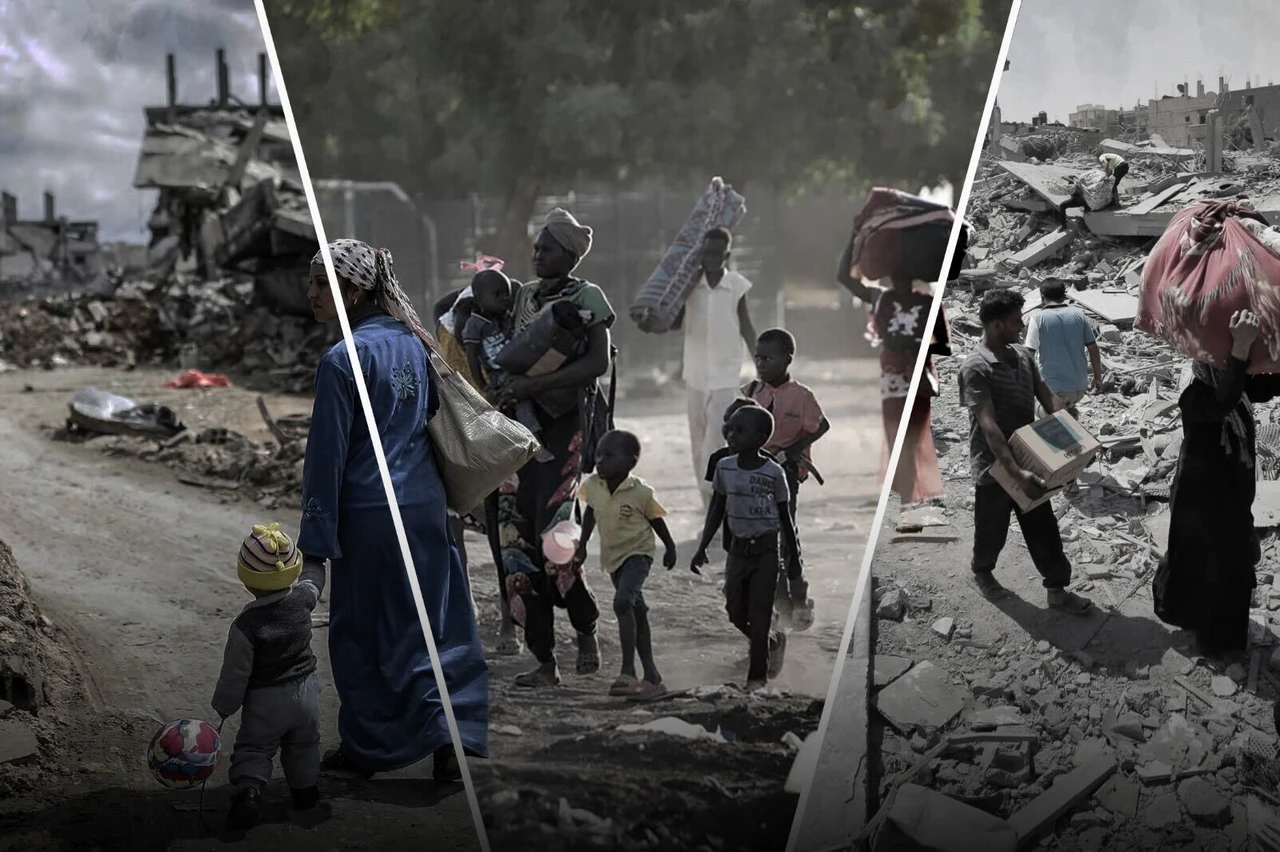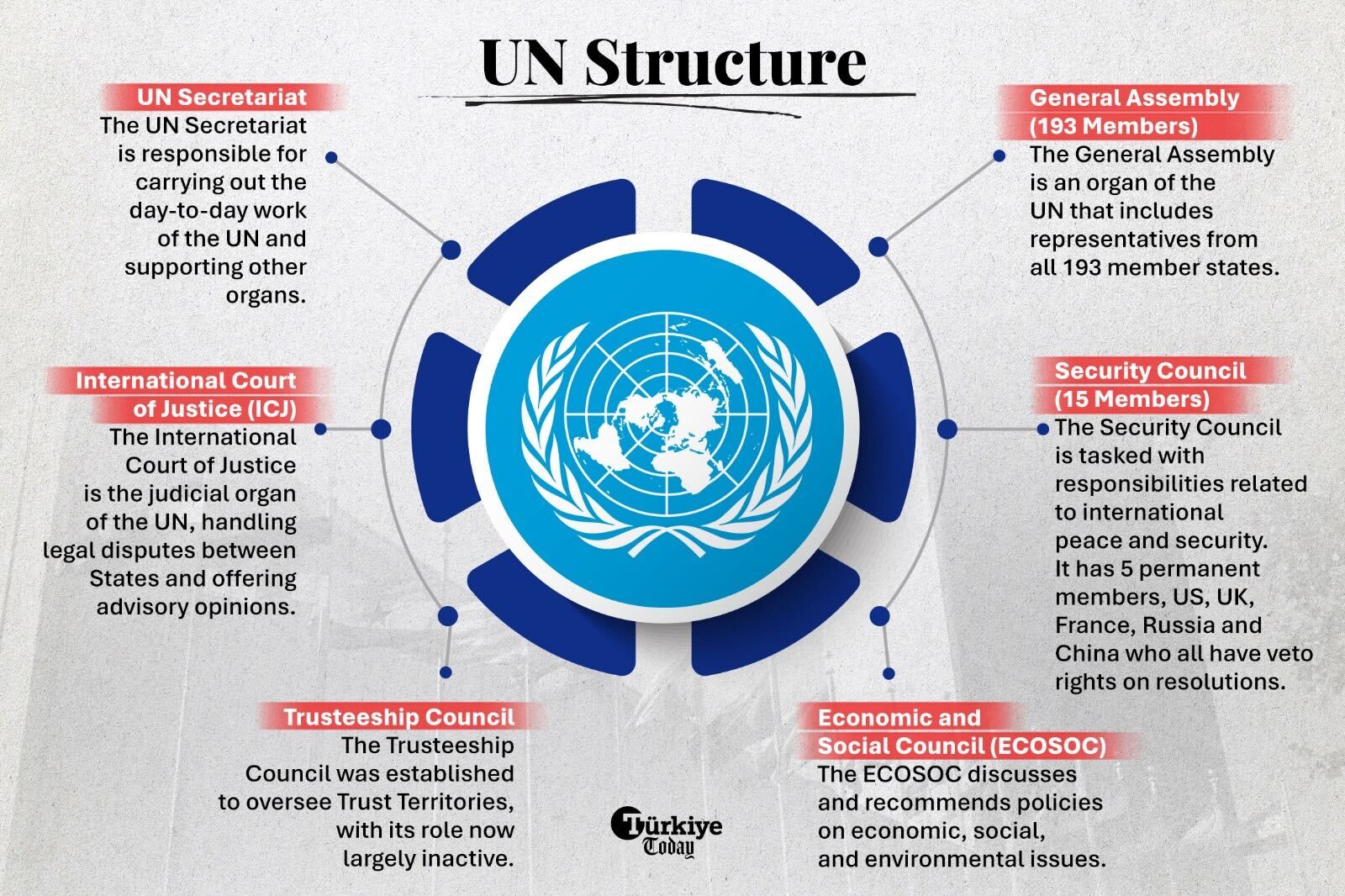UN’s shameful fiasco: Burning Gaza, starving Sudan, haunting Srebrenica Massacre
 The archives from various conflicts around the world than those of Gaza aand Sudan. (Photo collage prepared by Türkiye Today design team)
The archives from various conflicts around the world than those of Gaza aand Sudan. (Photo collage prepared by Türkiye Today design team)
As someone in the news business, I spend days hogging news related to genocides and wars around the world, questioning the effectiveness of the organizations responsible for maintaining peace.
This has become a ritualistic but unwanted practice. Our social media feeds are inundated with heart-wrenching photographs depicting the brutal genocide in Palestine. On the other end, images of children emaciated by famine and caught in the crossfire in Sudan evoke a profound sense of despair.
With a flood of depressing news pouring from around the globe, one might wonder: Do peacekeeping organizations still bear the responsibility of maintaining global peace through strategic interventions?
When it comes to global peacekeeping, one name towers above all others: the United Nations.
However, this is not the first time the peacekeeping organization has let the world down since its advent in 1945.
Burning Gaza
One formidable example is the ongoing conflict in Israel, which has evolved into a historic genocide in Palestine that has persisted since the establishment of the Jewish state in 1948. Following the Oct. 7, 2023 clashes between the Palestinian resistance group Hamas and Israel, over 39,000 people have died because of Tel Aviv’s brutalities, with over 495,000 facing the threat of catastrophic famine.
The humanitarian catastrophe in Gaza is beyond the U.N.’s capacity to resolve. The prolonged conflict and blockade have severely hampered the delivery of essential goods and services, despite repeated appeals and calls for a cease-fire by U.N. agencies. This raises serious questions about the efficacy and accountability of the peace-building organization.
Ghastly Srebrenica Massacre
It’s merely impossible not to mention the Srebrenica Massacre from 1945 when talking about the epic failures of the U.N. as a peacekeeper. The soul-crushing incident took place during the Bosnian War when Bosnian Serbs stormed the U.N.-declared “safe area” of Srebrenica. The area was segregated to protect civilians from the ongoing conflict.
Insult to injury, the Dutch peacekeepers were stationed right there to ensure safety when the incident took place massacring around 8,000 Bosnian Muslims, but couldn’t do a thing because of their limited mandate and lack of support.
The international community and mainly the U.N. landed in hot waters for delayed response leaving a dismaying question mark on the institution’s efficacy – yet again!
Starving Sudan
The ongoing Darfur conflict in Sudan also questions the role and responsibility of the U.N. as a peace-building organization. The humanitarian crisis in Darfur began in the early 2000s when rebel groups attacked the Sudanese government, accusing it of marginalizing the non-Arab population.
In response, the Sudanese government launched a brutal crackdown, involving government soldiers and Arab militias known as the “Janjaweed.”
These militias committed numerous crimes against non-Arab residents, including rape, murder, and forced relocation. The conflict has led to a severe humanitarian crisis with millions killed and displaced. The U.N.’s initial response to the Darfur crisis was widely criticized for being insufficient and slow. Peacekeepers were unable to adequately protect internally displaced persons or halt attacks in certain instances.
Divided Kashmir
Another historical example of the U.N.’s shortcomings is the Kashmir conflict, which began in 1947 after the partition of British India into India and Pakistan. Maharaja Hari Singh of Jammu and Kashmir initially sought to maintain independence but later signed the Instrument of Accession to India in October 1947, igniting the first Indo-Pakistani war. Since then, the U.N. has faced criticism for its failure to adequately address human rights violations in Kashmir.
Reports of abuses by both Indian and Pakistani forces have been documented, yet the international community, including the U.N., has struggled to address these issues comprehensively. The U.N. has had limited influence on the stakeholders, as both India and Pakistan remain steadfast in their positions, frequently disregarding U.N. recommendations.
These are just a few examples among many where peacekeepers have left the world disappointed because of ineffective and futile policies. Whether in the Yemen civil war, the Syrian civil war or the Iraq invasion, the U.N. has failed to fulfill its fundamental mandate of promoting global peace.
But why?
To understand the U.N.’s failures, one must examine the structural dynamics of the peacekeeping body. The U.N.’s governing bodies include the 193-member General Assembly and the 15-member United Nations Security Council (UNSC). The UNSC comprises the world’s five superpower states – the United States, United Kingdom, Russia, China, and France. Decision-making processes are often stalled because of the imbalanced distribution of power within the U.N.
Each member state of the U.N. has one vote in the General Assembly. The 10 UNSC members currently in office can vote but not veto any resolution. However, the five permanent UNSC members have the power to veto any resolution. Consequently, a single U.N. member state can override the votes of the vast majority.

For instance, the United States frequently exercised its veto power to thwart resolutions that held Israel accountable – especially during the wars in Gaza and Lebanon.
Similarly, Washington vetoed a UNSC resolution condemning the recognition of Jerusalem as the capital of Israel, which was seen as undermining international consensus on the status of the city marred by myriad conflicts.
In another instance, Russia and China blocked several resolutions seeking to denounce the conduct of the Syrian government during the civil conflict.
Another example of such instance is when the U.S. along with the U.K., utilized its veto power to force a resolution approving the invasion of Iraq through the Security Council despite the considerable objections of other members and the absence of clear U.N. approval.
Lack of consensus costing lives
It is clear that the organization’s structure concentrates power in the hands of the UNSC’s permanent members, marginalizing other states. This power monopoly not only causes delays because of a lack of consensus but also highlights how a few states dominate global affairs, including the resolution of the world’s most pressing conflicts – even if it comes at the cost of thousands of children being brutally killed or starving to death.
Another reason for the U.N.’s failure is its lack of an effective enforcement mechanism, which hampers its ability to implement resolutions and mandates, particularly in conflict regions where member states with diverse political interests may not comply or reach a consensus.
These limitations result in gridlock and delays in addressing global issues that require urgent attention.
This leads to some of the most daunting questions: Is the United Nations destined to be doomed? Will this peacekeeping body fail to prevent the anticipated World War III, just as the League of Nations, replaced by the U.N. in 1946, failed to prevent WWII from escalating? Are we heading toward an unmoored future where no one is held accountable for disrupting world peace?
Indeed, time will answer most of these questions (hopefully), but that doesn’t change the fact that strengthening peacekeeping bodies for accountability and justice is crucial to ensuring that perpetrators of serious war crimes are held accountable and that justice prevails in the world.
World order surely demands stronger peacekeeping!



